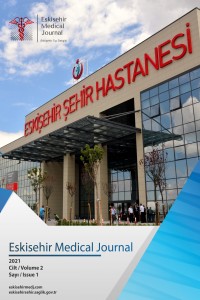Geniş QRS Kompleks Taşikardisi Olan Hasta: Sebep Sadece Kardiyak mı?
Abstract
Potasyum serum düzey değişlikleri kardiyak aritmilere yol açtığı için erken dönemde tanınmalıdır. Acil servisimize bulantı nedeniyle gelen hastanın monitörde geniş QRS kompleksli taşikardisi olduğu saptanmıştır. Hastanın hemodinamisi stabil olmaması sebebi ile kardiyoversiyon yapılarak ritim kontrolü sağlanmıştır. Yaşlılarda ve ek hastalığı olan hastalarda potasyumun atılımı ile ilgili problemler olabileceği ve diyetle alınan potasyum miktarı bilinmediğinden elektrokardiyografi değişikliklerinde potasyum düzey değişikleri akla gelmelidir. Bu şekilde acil servise başvuran ve tedavisi hızla başlanan hastaların sağ-kalım oranları artmakta ve morbidite oranları azalmaktadır.
References
- 1. Brugada J, Katritsis DG, Arbelo E, et al. 2019 ESC Guidelines for the management of patients with supraventricular tachycardiaThe Task Force for the management of patients with supraventricular tachycardia of the European Society of Cardiology (ESC). Eur Heart J. 2020 Feb 1;41(5):655-720.
- 2. Link MS, Berkow LC, Kudenchuk PJ, et al. Part 7: Adult Advanced Cardiovascular Life Support: 2015 American Heart Association Guidelines Update for Cardiopulmonary Resuscitation and Emergency Cardiovascular Care. Circulation. 2015 Nov 3;132(18 Suppl 2):S444-64.
- 3. Palmer BF, Clegg DJ. Diagnosis and treatment of hyperkalemia. Cleve Clin J Med. 2017 Dec;84(12):934-942.
- 4. Lavonas EJ, Drennan IR, Gabrielli A, et al. Part 10: Special Circumstances of Resuscitation: 2015 American Heart Association Guidelines Update for Cardiopulmonary Resuscitation and Emergency Cardiovascular Care. Circulation. 2015 Nov 3;132(18 Suppl 2):S501-18.
- 5. Mattu A, Brady WJ, Robinson DA. Electrocardiographic manifestations of hyperkalemia. Am J Emerg Med. 2000 Oct;18(6):721-9.
- 6. Çorbacıoğlu ŞK, Güler S, Yağmur D, ve ark. Aşırı Miktarda Kayısı ve Muz Tüketimi Sonrası Ciddi Hiperkalemi: İki Olgu Sunumu ve Literatürün Gözden Geçirilmesi. Turk J Emerg Med. 2012;12(1):41-4.
- 7. Te Dorsthorst RPM, Hendrikse J, Vervoorn MT, et al. Review of case reports on hyperkalemia induced by dietary intake: not restricted to chronic kidney disease patients. Eur J Clin Nutr. 2019 Jan;73(1):38-45.
- 8. Nyirenda MJ, Tang JI, Padfield PL, et al. Hyperkalaemia. BMJ. 2009 Oct 23;339:b4114.
- 9. Javed RA, Marrero K, Rafique M, et al. Life-threatening hyperkalaemia developing following excessive ingestion of orange juice in a patient with baseline normal renal function. Singapore Med J. 2007 Nov;48(11):e293-5.
- 10. Mueller BA, Scott MK, Sowinski KM, et al. Noni juice (Morinda citrifolia): hidden potential for hyperkalemia? Am J Kidney Dis. 2000 Feb;35(2):310-2.
Patient With Wide QRS Complex Tachycardia: Is The Cause Only Cardiac?
Abstract
Potassium serum level changes cause cardiac arrhythmias and should be recognized early. The patient who came to our emergency department with nausea was found to have a wide QRS complex tachycardia on the monitor. Since the hemodynamics of the patient was not stable, rhythm control was provided by performing cardioversion. Since there may be problems with excretion of potassium in the elderly and patients with comorbid diseases and the amount of potassium taken with
diet is unknown, potassium level changes should be considered in electrocardiography changes. In this way, the survival rates of the patients who are admitted to the emergency service and whose treatment is started rapidly increases and morbidity rates decrease.
References
- 1. Brugada J, Katritsis DG, Arbelo E, et al. 2019 ESC Guidelines for the management of patients with supraventricular tachycardiaThe Task Force for the management of patients with supraventricular tachycardia of the European Society of Cardiology (ESC). Eur Heart J. 2020 Feb 1;41(5):655-720.
- 2. Link MS, Berkow LC, Kudenchuk PJ, et al. Part 7: Adult Advanced Cardiovascular Life Support: 2015 American Heart Association Guidelines Update for Cardiopulmonary Resuscitation and Emergency Cardiovascular Care. Circulation. 2015 Nov 3;132(18 Suppl 2):S444-64.
- 3. Palmer BF, Clegg DJ. Diagnosis and treatment of hyperkalemia. Cleve Clin J Med. 2017 Dec;84(12):934-942.
- 4. Lavonas EJ, Drennan IR, Gabrielli A, et al. Part 10: Special Circumstances of Resuscitation: 2015 American Heart Association Guidelines Update for Cardiopulmonary Resuscitation and Emergency Cardiovascular Care. Circulation. 2015 Nov 3;132(18 Suppl 2):S501-18.
- 5. Mattu A, Brady WJ, Robinson DA. Electrocardiographic manifestations of hyperkalemia. Am J Emerg Med. 2000 Oct;18(6):721-9.
- 6. Çorbacıoğlu ŞK, Güler S, Yağmur D, ve ark. Aşırı Miktarda Kayısı ve Muz Tüketimi Sonrası Ciddi Hiperkalemi: İki Olgu Sunumu ve Literatürün Gözden Geçirilmesi. Turk J Emerg Med. 2012;12(1):41-4.
- 7. Te Dorsthorst RPM, Hendrikse J, Vervoorn MT, et al. Review of case reports on hyperkalemia induced by dietary intake: not restricted to chronic kidney disease patients. Eur J Clin Nutr. 2019 Jan;73(1):38-45.
- 8. Nyirenda MJ, Tang JI, Padfield PL, et al. Hyperkalaemia. BMJ. 2009 Oct 23;339:b4114.
- 9. Javed RA, Marrero K, Rafique M, et al. Life-threatening hyperkalaemia developing following excessive ingestion of orange juice in a patient with baseline normal renal function. Singapore Med J. 2007 Nov;48(11):e293-5.
- 10. Mueller BA, Scott MK, Sowinski KM, et al. Noni juice (Morinda citrifolia): hidden potential for hyperkalemia? Am J Kidney Dis. 2000 Feb;35(2):310-2.
Details
| Primary Language | Turkish |
|---|---|
| Subjects | Clinical Sciences |
| Journal Section | Case Report |
| Authors | |
| Publication Date | March 6, 2021 |
| Published in Issue | Year 2021 Volume: 2 Issue: 1 |


